Deep Ellum Blues
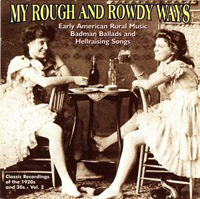 |
Although this song memorializes a specific district in Dallas, Texas, it first appears on record in 1927 under a different title making reference not to Deep Ellum, but to a much more generic Black Bottom, which could have been an African American neighborhood in many Southern cities. It was recorded by an ephemeral group calling itself The Georgia Crackers made up of Paul and Leon Cofer on fiddle and banjo and Ben Evans on guitar. Though the lineage may be uncertain, the kinship to our song is unmistakable. Hear for yourself:
Audio Clip: The Georgia Crackers play Black Bottom Blues, 1927
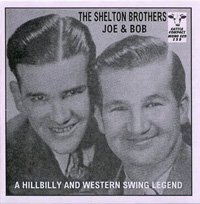 |
As Deep Elem Blues (the spelling of which appears variously as Elm, Elem and Ellum) the song first hit disk in 1935. It was recorded on Decca by brother duo Bob and Joe Attlesey who called themselves, naturally, The Shelton Brothers (their mother's family names, and presumably more commercial sounding. Showbiz.) The song must have done them very well; they recorded it no fewer than three times and penned at least a couple others making reference to the neighborhood: Just Because You're in Deep Ellum and What's the Matter with Deep Elm? Here's one of the versions they recorded:
Audio Clip: The Sheldon Brothers play Deep Elem Blues
It's a little strange that most of the recordings of the song are by white artists given that, in the era this song recalls, Deep Ellum was a predominantly black district that grew up around the Houston and Texas Central Railroad (H&TC) tracks — later known as Central Track — on what would have then been the eastern edge of Dallas. According to Kevin Pask's interesting historical essay devoted to the song and place:
The H&TC brought cotton pickers to and from the fields of the Texas cotton belt at the same time that elite Dallas was making some of its first fortunes in the cotton trade; others came to work in Robert Munger's cotton gin factory, or later the Ford factory, both in the neighborhood, which also quickly established itself as the entertainment and shopping district of black Dallas, and thus also much of Texas and surrounding states.
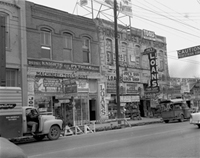 |
Blues buffs have long noted that Deep Ellum attracted some of the best Blues musicians of the region, including Blind Lemon Jefferson, Mance Lipscomb, Blind Willie Johnson and Lead Belly. But if you go down to Deep Ellum to have a little fun nowadays you'll find a very different place. In his section on The Demise of Deep Ellum, Pask recounts a story that will ring familiar to anyone with a passing knowledge of urban renewal in this country:
Although the roots revivalism of 1960s music popularized Deep Ellum's music, the neighborhood itself had virtually disappeared after the construction of Central Expressway in the late 1940s and 50s....This was the era that fixed the division between South and North Dallas as one between white and black, poor and rich. As was generally the case with such developments all across America, the expressway took the path of least resistance: railroad land and the neighborhoods of poor people, which often went together.
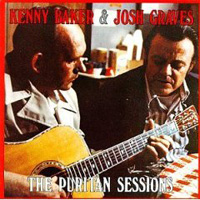 |
Whoever inhabited the real streets and alleys of Deep Ellum, it's largely been white country artists who have kept the song alive down through the decades. In 1973, fiddler Kenny Baker and dobro guru Josh Graves included it on their album Bucktime (later re-released on CD with another album as The Puritan Sessions.) Skimming the customer reviews at Amazon I came across this well-informed tidbit from "Joe Sixpack" (aka Lawrence Kay, who blogs at slipcue.com).
These sessions are notable not only for the fluid, sympathetic interplay between two mellow-minded old-timers, but also for the chance to hear Baker playing guitar -- which he had to stop doing after an accident in 1977 that damaged the nerves in his left hand.
Here are Baker and Graves having at it. If this doesn't sound like fun to you, well, you just ain't right.
Audio Clip: Kenny Baker and Josh Graves pickin' on Deep Ellum Blues, 1973
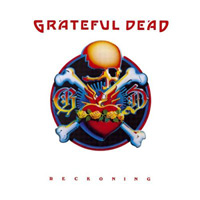 |
Not one to leave a good country song to the hillbillys, Jerry Lee Lewis made a Rock 'N Roll romp of it in the late 50's. Here's a clip from his take on Deep Ellum:
Audio Clip: Jerry Lee Lewis on Deep Ellum Blues
But as is the case for several other traditional songs, the rock group more responsible than any other for this one's enduring popularity (such as it is) is The Grateful Dead. They performed the song from their earliest days together and there are numerous recordings of their renditions available. Here's a sampling of one from a live performance in 1980.
Audio Clip: The Grateful Dead perform Deep Ellum Blues
All Community Guitar Resources text & material © 2006 Andrew Lawrence
